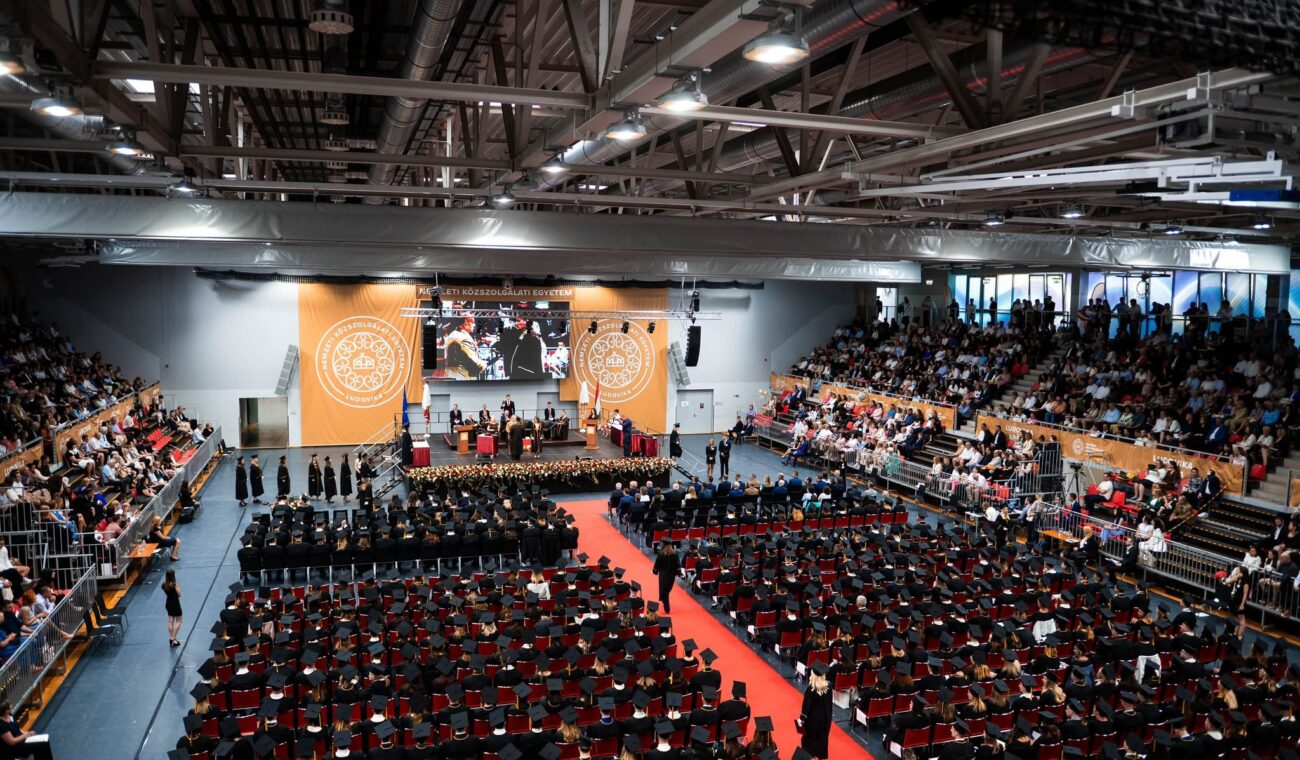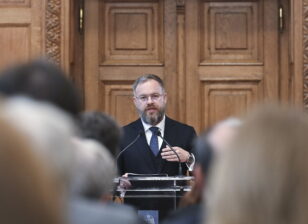Graduation speech at the Faculty of Political Science and International Studies, Ludovika University of Public Service
Graduation speech at the Faculty of Political Science and International Studies, Ludovika University of Public Service
Honorable Chairmen! Dear graduating students! Dear parents and relatives! Ladies and gentlemen!
I warmly welcome you to the graduation ceremony of the Faculty of Public Administration and International Studies at the National University of Public Service.
The very moment you, sitting here today, decided to enroll in the National University of Public Service – or Ludovika, as we call it – a few years ago, you did not simply sign up for a profession. With that decision, you said yes to something more meaningful: serving the community. Because public service is not a profession, it is a vocation. It requires not only knowledge, but also integrity. And integrity cannot be learned from textbooks. Integrity begins at home, from the example set by parents, then nurtured at school by the attention of teachers and the guidance of mentors. That is why we express gratitude to those who are here today not only as spectators, but as role models standing behind you and beside you. You give this generation not only knowledge, but also integrity. Those who are here today already know that the future of a country rests on whether we succeed in transferring the purpose for which it is worth believing, the purpose for which it is worth caring, and the purpose for which it is worth serving our country. From this point the future of Hungary is shaped by you.
Recently, I came across one of the essays of Zoltán Magyary, who is held in high esteem at this faculty, in which he examined the causes of the downfall of the 1920s. Not specifically about Hungary, but in general. He attempted to find the answer to the question of why European states collapsed under the weight of the First World War. Magyary argues that the 19th-century state was simply drawn to a 20th-century war. This led to the collapse of the state. In many countries the contemporary state system was not equipped for the challenges of the new era. This idea remains valid even today, because if we do not understand the era in which we live, if we do not equip the state for it, another moment may arise when the latest challenge in the world would be too overwhelming for us. And so the question is: will we recognize in time what kind of world is coming our way? History teaches us that global upheavals cannot be predicted. But there are signs that are worth paying attention to.
One such sign is the growing tension between major powers. Over the past 500 years—as you may have learned—there have been 16 instances of a rising power challenging the dominant power. Twelve of these instances resulted in war. Today, a new division of power is in progress, but we cannot yet see who will draw the final lines and where. Another sign is when the number of smaller conflicts around the world rapidly increases. At the end of the Cold War, as recorded in the history books, there were 111 active armed conflicts between states. Today, there are 184. Another sign is that the world spends more and more on arms. Today, the global spending is one and a half times as much as it was 20 years ago. The turnover of the hundred largest arms companies has also increased by 150%. Another sign is that the global economy is becoming more fragmented. In ten years, the number of trade restrictions has increased fivefold. Finally, migration is also a warning sign: since 1990, the number of people who have left their homes due to conflict or other pressures has doubled. Today, nearly 300 million people are part of global migration processes. So what is the response to this situation? The answer is to recognize the patterns and signs. The answer is not fear, nor drifting with the currents. The correct response should be a sober, calm preparation. A student prepares for an exam to avoid failure, and this is exactly what we must do to avoid harm. Because now, history does not only ask questions, it is also testing us. And those who stay out of the conflicts in a turbulent world will pass with the best grades. We in Hungary are not only watching the turmoil in the world, but we are also trying to prepare for them. And if, God forbid, another world war emerges, we will still preserve Hungary’s peace, security, and the prospect of prosperity. To this end, I believe we must follow five basic principles, which are about survival, prosperity and peace.
The first principle is that we should be predictable, but not exposed. This means that we should be able to make our own decisions, but not isolate ourselves from the world. Our foreign relations are driven by realism and national interests. Hungary today enjoys good relations with the world’s most important powers. The Hungarian presence is increasingly evident in more and more countries.
The second principle is that we must be strong. But not against others, only in defense of ourselves. The modernization of the armed forces, the establishment of a high-tech military industry, and the fulfillment of NATO commitments of over 2% of GDP demonstrate that Hungary is not drifting, instead it is consciously expanding its own capabilities.
The third principle: let us prepare for any crisis, be it energy, food, or the digital space. In recent years, Hungary has made key investments in infrastructure and energy, we have connected to the South-Eastern trade corridor in regards of energetics, new gas pipelines and logistics centers have been built, while self-sufficiency in food production and data security have increased.
The fourth principle is to invest in knowledge and people, because in scenarios like these, our best resource is community. It is rarely talked about, it still remains a fact that currently Hungary is the highest spender on higher education and family support in the European Union in proportion of the GDP. The reason for this is that we believe that the future begins where there are more ideas, more children, and more dedication.
The fifth principle is to have a long-term strategy that spans generations. We call this, using a strange, foreign term, connectivity. The Hungarian connectivity strategy is based on connecting in all directions in economy, politics and culture. Our goal is to be an embedded and respected member of the world order. This is also how Hungarian sovereignty is built. In a state, the most dangerous thing you can hear in such a situation is that we have always done it this way. The upcoming decades cannot be solved by routine. Finesse is crucial.
So, dear graduating students!
You are set to become the new generation of the Hungarian civil servants. Routine will not be enough; you will also need to bring finesse to the job. Your training has therefore not only been about learning rules, but also about recognizing that running the state requires foresight, responsibility, and moral integrity. You have gained an understanding of Hungary’s goals and of how to implement a successful strategy to achieve them. You have studied geopolitics, political science, international relations and strategic thinking in great detail. You have learned that public service does not differ from other professions because it is more difficult, it is different because the fate of others depends on it. But perhaps the most important thing you have learned is that being a Hungarian civil servant is also an identity. And identity is not about what we know, but about what we consider valuable, worthy of protecting and worthy of passing on. And there is one last thing that you may not have studied as a subject, but perhaps you have acquired, regardless. We may call this civil servant resourcefulness. It is the knowledge of how to get things done, even when the path is winding. There is an anecdote about Zoltán Magyary, whom I mentioned earlier, who asked the head of department during an investigation: where do unresolved case files go? His reply was: we put them aside to the left. To which Magyary simply remarked: in public administration, the left is not an ideological question, but a furniture instruction manual. The key insight to be learned here is that a well-functioning state does not allow matters to be pushed aside to the left. It will be your job to ensure that those particular files move forward, not to the left.
I wish you plenty of success in the years ahead. Congratulations to the graduates! Thank you very much for taking on this profession! Serve the country and all Hungarians well!
Congratulations!
Thank you for listening.



